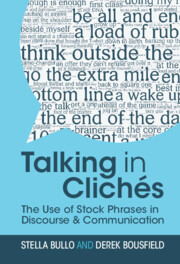
-
Select format
-
- Publisher:
- Cambridge University Press
- Publication date:
- 27 October 2022
- 03 November 2022
- ISBN:
- 9781108559010
- 9781108471633
- 9781108458139
- Dimensions:
- (229 x 152 mm)
- Weight & Pages:
- 0.45kg, 212 Pages
- Dimensions:
- (229 x 152 mm)
- Weight & Pages:
- 0.32kg, 212 Pages
You may already have access via personal or institutional login
Book description
For decades, social perspectives, and even academic studies of language, have considered clichés as a hackneyed, tired, lazy, unthinking and uninspiring form of communication. Authored by two established scholars in the fields of Systemic-Functional Linguistics and Discourse Studies and Pragmatics, this cutting-edge book comprehensively explores the perception and use of clichés in language from these complementary perspectives. It draws data from a variety of both written and spoken sources, to re-interrogate and re-imagine the nature, role and usage of clichés, identifying the innovative and creative ways in which the concepts are utilised in communication, interaction, and in self-presentation. Observing a rich, complex layering of usage, the authors deconstruct the many and varied ways in which clichés operate and are interdependently constructed; from the role they play in discourse in general, to their functions as argumentative strategies, as constructs of social cognition, as politeness strategies, and finally as markers of identity.
Reviews
'… this book is essential reading for graduate students and faculty in the disciplines of communication and rhetoric. Its ideas can be used to stimulate critical thinking in basic undergraduate communication or language arts courses. … Highly recommended'
M. M. Stoltz Source: Choice
Contents
Metrics
Altmetric attention score
Full text views
Full text views help Loading metrics...
Loading metrics...
* Views captured on Cambridge Core between #date#. This data will be updated every 24 hours.
Usage data cannot currently be displayed.
Accessibility standard: Unknown
Why this information is here
This section outlines the accessibility features of this content - including support for screen readers, full keyboard navigation and high-contrast display options. This may not be relevant for you.
Accessibility Information
Accessibility compliance for the PDF of this book is currently unknown and may be updated in the future.


